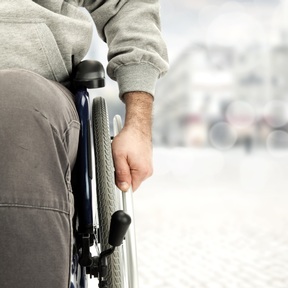Disabled people in Britain are being 'left out in the cold'
Disabled people are being ‘left out in the cold’ as most UK homes do not have front doors that are easily accessible, according to a leading charity.

A recent survey carried out by Leonard Cheshire Disability found 75 per cent of houses in Great Britain do not have ‘disabled-friendly’ front doors that are accessible by a ramp or with step-free access.
The findings coincide with the Government’s plans to make it more difficulty for local authorities to insist developers build ‘disabled-friendly’ housing. The House of Lords is debating the Deregulation Bill and as a result Leonard Cheshire Disability is campaigning for ‘disabled-friendly’ housing.
Philip Barton a planning consultant and wheelchair user, from Merseyside, said: “It took me two years of misery to find a house that I could actually get in and out of. I've recently tried to move to a different area of the country where I had been offered a different job, but there were no houses that I could live in comfortably – so I had to turn down the job.
“We need to build more disabled-friendly homes now so that disabled people can progress in their careers and move around the country like anyone else.”
Regionally, the survey indicated that of houses surveyed in London, 64 per cent had accessible front doors, however the East Midlands reported 81 per cent of houses having non ‘disabled-friendly’ front doors.
Disabled trapped in their own homes
Further to its findings, Leonard Cheshire Disability also found 65 per cent of British homes do not currently have bathrooms big enough to fit a wheelchair in.
A wheelchair user from Greater Manchester, Carlene Evans said: “Not being able to get into the homes of my family and friends is really upsetting. It means I’m shut out of social occasions of all sorts. What’s even worse is that I can’t get in through my own front door.
“My husband and I feel trapped because we can’t find a suitable home to move to either - the door to disabled-friendly housing is slammed shut for us, as it must be for millions in our situation. I don’t understand why the Government is planning to make it harder for councils to increase the number of ‘disabled-friendly’ homes.”
Leonard Cheshire Disability is campaigning for the Government to reject new proposals that make it harder for local authorities to insist developers build ‘disabled-friendly’ adaptable housing under the Deregulation Bill.
A separate proposal outlines plans to prevent the Government from ensuring exclusively that private developers build wheelchair-accessible housing.
The Deregulation Bill allows local councils to build new homes that meet the Lifetime Homes standards; however these standards are set to be ‘optional requirements’. The bill also states that local councils would need to give evidence of their need to build ‘disabled-friendly’ homes. The proposals prevent local authorities from building homes to fully wheelchair accessible standards and only call for homes to be ‘wheelchair adaptable.
 Clare Pelham, Leonard Cheshire Disability chief executive, said: “It is simply wrong that thousands of disabled people are ending up trapped all day in homes that are completely unsuitable for them. That makes for a miserable and lonely life for many disabled and older people. And it costs the taxpayer money.
Clare Pelham, Leonard Cheshire Disability chief executive, said: “It is simply wrong that thousands of disabled people are ending up trapped all day in homes that are completely unsuitable for them. That makes for a miserable and lonely life for many disabled and older people. And it costs the taxpayer money.
Laws needed to increase number of accessible homes
“Many disabled people are unable to move house and get a job because there aren't enough ‘disabled-friendly’ properties. Other older and disabled people could live independently in a properly-adapted home but are forced into residential care. Government should be making laws that increase the number of accessible homes, not reduce them. The shortage will only get worse as more and more of us live longer and need support to maintain our independence.”
There are one in ten people within the UK who have a mobility problem which equates to five million people who may need ‘disabled-friendly’ homes. As part of the charities Home Truths campaign, it is appealing for all new homes to be built as ‘Lifetime Homes’ so they are easy to adapt if people become disabled.
Lifetime Homes are designed with wider door ways to allow wheelchairs to fit through, stairs wide enough to fit stair lifts and with walls strong enough to fit grab rails in the bathroom. The Home Truths Campaign asks that 10 per cent of large developments be built with wheelchair access to allow disabled people to live independently across the country.
Ms Pelham added: “Any one of us could become disabled at any time – in a car accident, from a stroke, or as a soldier in conflict.
“Let’s hope that the Government amends the Deregulation Bill later this month so all new build homes can be easily adapted for disabled people. We need to increase the number of ‘disabled-friendly’ homes now, so that all of us can live independently in the future.”
The charity Leonard Cheshire Disability is the largest voluntary sector provider of support and services for disabled people in the UK.
Latest News Analysis
 04-Sep-19
Extra £1.5 billion announced for social care in Chancellor's Spending Review
04-Sep-19
Extra £1.5 billion announced for social care in Chancellor's Spending Review
 17-Jul-19
Flexible Working Bill for all jobs gets MPs approval - delighting parents, disabled and carers
17-Jul-19
Flexible Working Bill for all jobs gets MPs approval - delighting parents, disabled and carers
 18-Jun-19
Overnight care workers forced to sleep in offices and told 'bring your own bedding'
18-Jun-19
Overnight care workers forced to sleep in offices and told 'bring your own bedding'
 11-Jun-19
PM candidates on social care: Rory Stewart calls fixing care an 'unfinished revolution'
11-Jun-19
PM candidates on social care: Rory Stewart calls fixing care an 'unfinished revolution'
 05-Mar-19
Amber Rudd announces scrapping of controversial PIP payment review for pensioners
05-Mar-19
Amber Rudd announces scrapping of controversial PIP payment review for pensioners